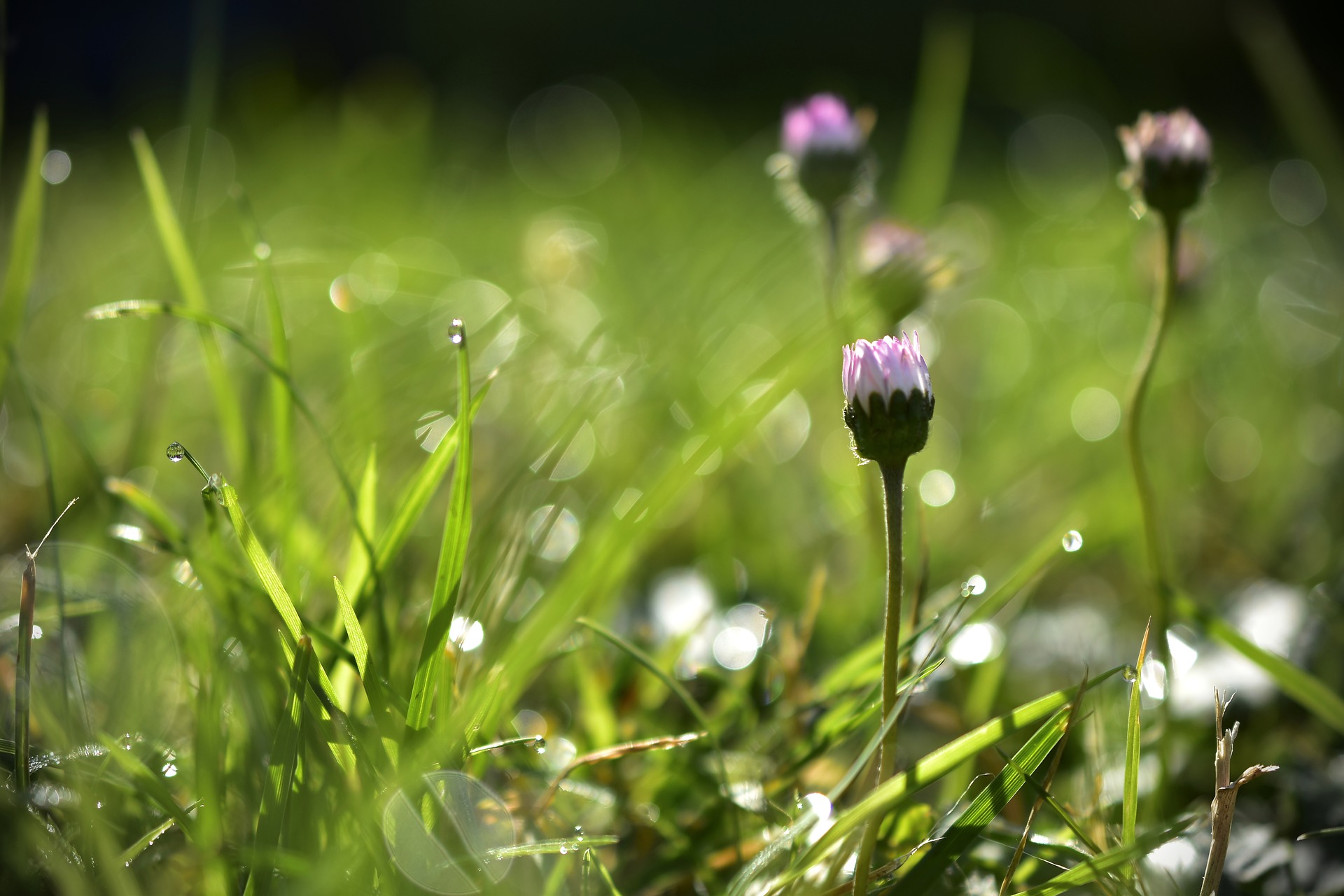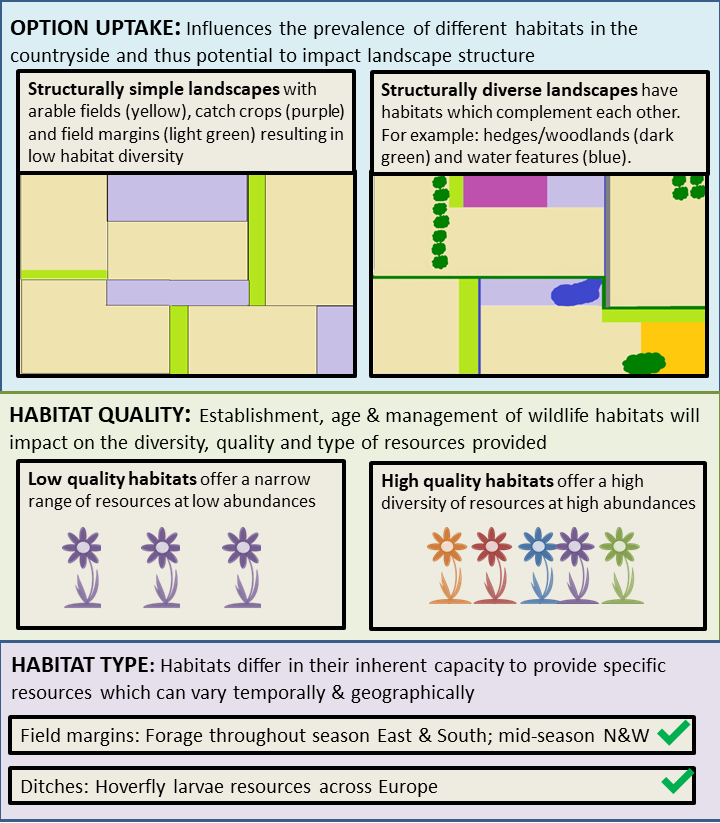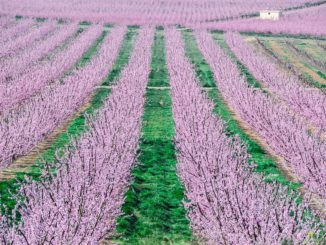
Lorna Cole, SRUC summarises a recently published review she undertook with 21 other pollinator experts across 18 European countries. Insect pollinators continue to decline across Europe despite the Common Agricultural Policy’s increased focus on environmental protection. In response, this group of experts are calling for the improved quality of wildlife habitats through more targeted management and a robust monitoring framework, and a diversity of habitats to meet the resource requirements of our pollinating insects.
Introduction
Pollinating insects, like bees and hoverflies, face a range of pressures including climate change and the loss of high-quality habitats as a result of agricultural intensification. Consequently, in some parts of Europe pollinators are now struggling to find the resources they require. With 84% of the major crops worldwide – including those used for food and medicine – and 88% of flowering plants relying on insect pollinators, we need to act now to prevent further loss.
Currently, over 70% of Scotland’s total land area is used for agricultural production, ranging from intensively managed arable or dairy systems to sheep grazed heather moorland. The role of farming, and indeed agri-environment schemes, in protecting pollinators, and wider biodiversity, cannot be underestimated.
The 2014 Common Agricultural Policy – a European partnership scheme supporting farmers to supply affordable food – sought to improve environmental sustainability by linking the payments that support farmers to compulsory greening measures. Three greening measures were introduced: maintenance of permanent pastures, crop diversification, and Ecological Focus Areas (EFAs). EFAs specifically aimed to provide ecologically beneficial areas within arable cropping systems to ‘safeguard and improve biodiversity on farms’.
EFAs have the potential to increase the abundance and diversity of vital resources for pollinators in agricultural landscapes, like food, shelter, nesting, breeding and overwintering sites, by introducing pollinator-friendly options like ponds, buffer strips and hedges etc.
However, the success of EFAs at meeting biodiversity goals has been fiercely challenged, with a large number of farms across Europe being exempt and favouring more production orientated EFAs.
Along with 21 other pollinator experts across 18 European countries, I evaluated how different EFA options across Europe have supported pollinators by providing key resources. We explored how their management and their uptake influenced the resources they provided. Here is what we found:
- EFA’s across Europe are currently failing to provide all the resources pollinators require at enough quantities.
- EFA options differed in the amount and type of resources they offered, and this varied across Europe. Even when specifically managed for pollinators, most EFA options failed to provide all resources pollinators need.
- We identified substantial opportunities to improve the quality of EFA options and the post-2020 CAP should put a greater emphasis on creating high-quality habitats that are evaluated by a comprehensive monitoring framework.
- To effectively deliver the CAP’s Green Architecture, landscape-level initiatives are required to spatially target options to ensure all resources pollinators require are locally available.
- EFA options favour nitrogen-fixing crops and catch crops resulted in perceived shortages in bee nesting sites, late-season forage and resources for hoverfly larvae.
- With most habitats failing to provide the full range of resources pollinating insects require, diverse habitats are required to meet resource requirements.
What does this mean for UK and Scottish Farming?
The Scottish Government explains that following the UK exiting the European Union, the EU will not be able to make laws in the UK. However, in the short term, EU law will be retained by the UK, including CAP rules and schemes. The UK Government are in the process of taking wide-ranging powers through their own respective Agriculture Bill in the UK Parliament, which would allow them to partially replace the CAP with a new policy.
There is an opportunity for the UK, and Scotland, to make future schemes greener and more targeted to farms or regional requirements (e.g. diffuse pollution mitigation, pollinator conservation). To safeguard pollinators in agroecosystems, there is a need to shift emphasis beyond simply improving habitat quantity to explore options that increase habitat quality, connectivity and complementarity to ensure that pollinators have access to all necessary resources in sufficient quantities.
Our review has shown that EFAs are largely failing to deliver all necessary pollinator resources at enough quantities in European agricultural landscapes. This indicates that maintaining a diversity of habitats is required to ensure that pollinators can meet their resource requirements. Identifying habitat packages that provide all resources pollinators require and delivering these through landscape-level initiatives is therefore vital to conserve pollinator populations in the UK. Realistically this could only be achieved through incentivising collaboration between farmers and other stakeholders to spatially target measures.
This article was originally published on the SEFARI website
More on EFAS
Ecological Focus Area in Germany: What Influences Farmers’ Decisions?
Ecological Focus Area (EFA) in Germany: good for biodiversity & the tax payer?
#AfterCAP | Fit, Fair & Sustainable: A new agricultural policy model for the CAP 2021
Parliament Votes to Ban Pesticides from Ecological Focus Areas
Ecological Focus Area (EFA) in Germany: good for biodiversity & the tax payer?
18 Member States Fight to Keep Pesticides in Ecological Focus Areas
‘CAP-itulation’ – EU Commission gives up further EFA criteria





